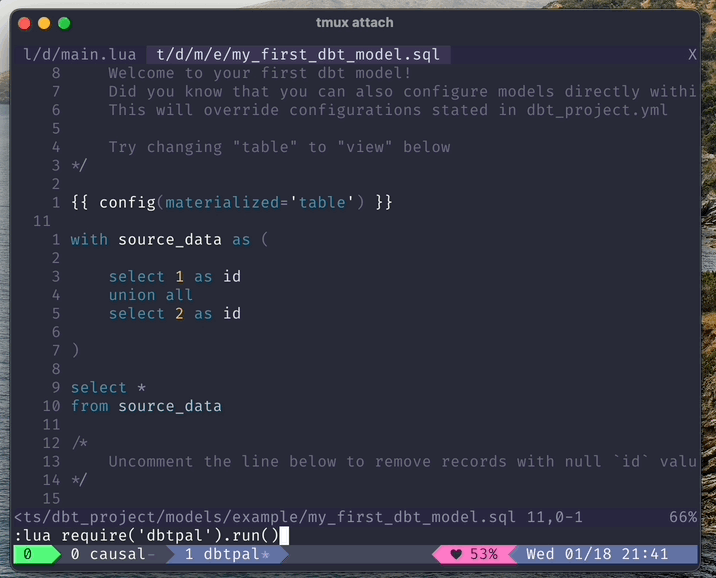A Neovim plugin for dbt model editing. The little helper I wish I always had.
I don't use dbt day-to-day so I don't spend much time on this package. However, I do still accept issues and PRs, so please continue to send them in.
- Run / test open model, the entire project, or arbitrary selectors
- Async jobs with pop-up command outputs
- Custom dbt filetype with better syntax highlighting
- Disables accidentally modifying sql files in the target folders
- Jump to any
reforsourcemodel usinggf(go-to-file) - Telescope Extension to fuzzy-find models
- Automatically detect dbt project folder
I do welcome requests and use-cases, so feel free to reach out on Twitter (@pdrmnvd) or by creating an issue.
- Neovim >=0.5.0
- dbt >=1.0.0
- plenary.nvim
Install using your favorite plugin manager:
Using Packer
use {
"PedramNavid/dbtpal",
config = function()
local dbt = require("dbtpal")
dbt.setup({
-- Path to the dbt executable
path_to_dbt = "dbt",
-- Path to the dbt project, if blank, will auto-detect
-- using currently open buffer for all sql,yml, and md files
path_to_dbt_project = "",
-- Path to dbt profiles directory
path_to_dbt_profiles_dir = vim.fn.expand("~/.dbt"),
-- Search for ref/source files in macros and models folders
extended_path_search = true,
-- Prevent modifying sql files in target/(compiled|run) folders
protect_compiled_files = true,
})
-- Setup key mappings
vim.keymap.set("n", "<leader>drf", dbt.run)
vim.keymap.set("n", "<leader>drp", dbt.run_all)
vim.keymap.set("n", "<leader>dtf", dbt.test)
vim.keymap.set("n", "<leader>dm", require("dbtpal.telescope").dbt_picker)
-- Enable Telescope Extension
require("telescope").load_extension("dbtpal")
end,
requires = { { "nvim-lua/plenary.nvim" }, { "nvim-telescope/telescope.nvim" } },
}Using lazy.nvim
Show configuration...
{
"PedramNavid/dbtpal",
dependencies = {
"nvim-lua/plenary.nvim",
"nvim-telescope/telescope.nvim",
},
ft = {
"sql",
"md",
"yaml",
},
keys = {
{ "<leader>drf", "<cmd>DbtRun<cr>" },
{ "<leader>drp", "<cmd>DbtRunAll<cr>" },
{ "<leader>dtf", "<cmd>DbtTest<cr>" },
{ "<leader>dm", "<cmd>lua require('dbtpal.telescope').dbt_picker()<cr>" },
},
config = function()
require("dbtpal").setup({
path_to_dbt = "dbt",
path_to_dbt_project = "",
path_to_dbt_profiles_dir = vim.fn.expand("~/.dbt"),
extended_path_search = true,
protect_compiled_files = true,
})
require("telescope").load_extension("dbtpal")
end,
}dbtpal has sensible defaults and can auto-detect project directories based on the currently open buffer when first run.
Your typical dbt commands are supported in three modes: current model, all models, and user-specified models. See the sample setup above for some common mappings.
Commands can be either invoked as vim user-commands or through lua. Lua calls provide more flexibility if additional arguments are required, but user-commands work well if all you need is the default behavior, with a single model selector argument.
In Lua: require('dbtpal').run()
Run the current model
In Lua: require('dbtpal').run_all()
Run all models in the project
In Lua: require('dbtpal').run_model('+my_second_dbt_model')
Run a specific model or selector. Requires a model selector argument.
Example: DbtRunModel +my_second_dbt_model
In Lua: require('dbtpal').test()
Test the current model
In Lua: require('dbtpal').test_all()
Test all models in the project
In Lua: require('dbtpal').test_model('+my_second_dbt_model')
Test a specific model or selector. Requires a model selector argument.
Example: DbtTestModel +my_second_dbt_model
In Lua: require('dbtpal').compile()
Compile the current model
In Lua: require('dbtpal').build()
Build the current model
These commands are only available as Lua-only commands. You can map them to specific key-bindings if you wish.
require('dbtpal').run_children(): equivalent to dbt run -s model+
require('dbtpal').run_parents(): equivalent to dbt run -s +model
require('dbtpal').run_family(): equivalent to dbt run -s +model+
You can override default configuration options by passing a table to setup({}).
See the Installation section for an example
require("dbtpal").setup({ ... })
The following options are available:
| Option | Description | Default |
|---|---|---|
| path_to_dbt | Path to the dbt executable | dbt (i.e. dbt in the local path) |
| path_to_dbt_project | Path to the dbt project | "" (auto-detect) |
| path_to_dbt_profiles_dir | Path to dbt profiles directory | "~/.dbt" |
| extended_path_search | Search for ref/source files in macros and models folders | true |
| protect_compiled_files | Prevent modifying sql files in target/(compiled|run) folders | true |
Log level can be set with vim.g.dbtpal_log_level (must be before setup())
or on the command line: DBTPAL_LOG_LEVEL=info nvim myfile.sql
